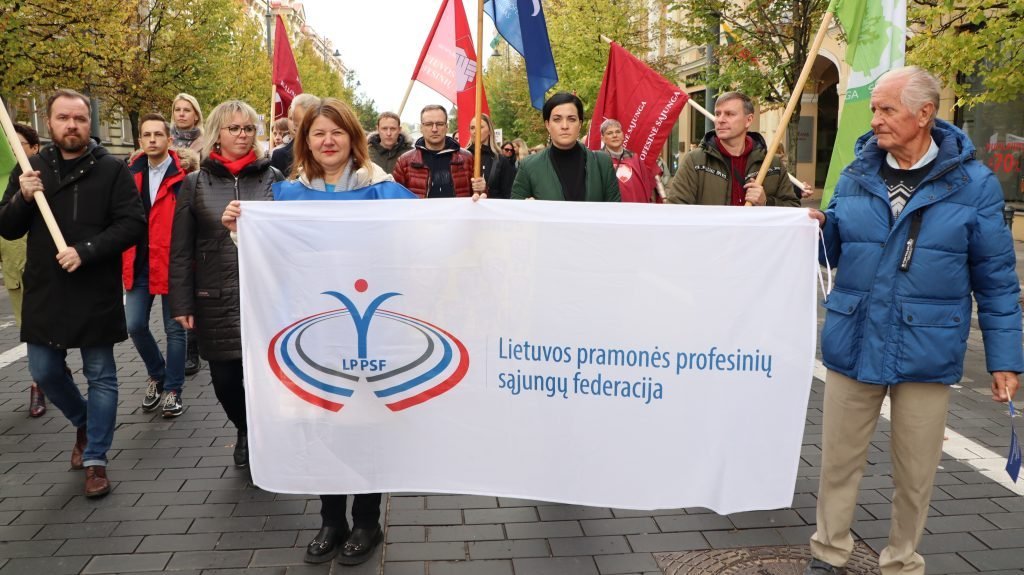In solidarity with the worker mobilizations against austerity happening in Paris on October 13th, three Lithuanian trade union centers organized a march and a rally in Vilnius. Around 600 people marched in the main street and chanted “We want social justice and solidarity”, “Don’t tighten belts – there are no holes left”, and “No to austerity policies”. The protesters also displayed signs with messages such as “We demand fair pay for our work”, “Wages are not charity”, “Living decently on the minimum wage is a mission impossible”.
The demonstration was finalized in the square next to the Lithuanian Parliament, where leaders and representatives of the trade unions, as well as several politicians could address the workers. Prior to this, the unions had sent their demands to the country’s leaders, President Gitanas Nausėda, Speaker of the Seimas Viktorija Čmilytė-Nielsen, and Prime Minister Ingrida Šimonytė.
The trade unions expressed concern about the low salaries of public sector workers, increasing workloads leading to a critical shortage of teachers, medical professionals, social workers, police officers, and cultural workers, especially in the regions. The trade unions also highlighted that the recently launched public service reform focused solely on increasing the salaries of the leaders, leaving workers with nothing. Moreover, their salaries are “frozen” for several years.
“Here are gathered not only representatives from the public sector, but also people from the private sector who say they deserve to live better, yet their salaries are not increasing as they should. Today we are only talking about budget expenses, but nothing is said about revenues. What happened to the tax reform? It sank into oblivion, and once again the Government sent a message that it is protecting the capital,” said Inga Ruginienė, the president of the Lithuanian Trade Union Confederation.
Demands presented by the trade unions include:
- Halt the advancement of the Budgetary Institutions Law project until it is coordinated with social partners.
- Make salaries of public sector workers dependent on the average national wage growth and review them annually.
- Halt the transformation of state and municipal enterprises into joint-stock companies, which opens the way for possible privatization.
- Give priority in public procurement competitions to socially responsible companies whose employees are organized into trade unions and have collective agreements.
- Promote collective bargaining and collective agreements.
- Ensure the principle of justice in reforming the tax system and introduce real progressive taxes for all types of income.
- Liberalize the organization of strikes.
- Strengthen state capacities to combat the shadow economy and legalize penalties for businesses which do not abide.
The letter to the Government officials also warns, that with a shortage of medical professionals, teachers, social workers and others, the country’s foundation is gradually being undermined, without which ensuring national security will be impossible.







